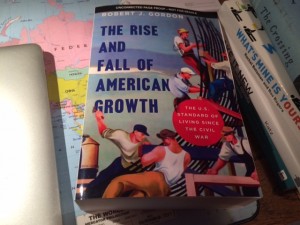James Bessen’s book [amazon_link id=”0300195664″ target=”_blank” ]Learning By Doing: The Real Connection between Innovation, Wages and Wealth[/amazon_link] is excellent. It strikes a balance between meaty analysis and description of historical episodes of technical change, and is at the same time very accessible.
[amazon_image id=”0300195664″ link=”true” target=”_blank” size=”medium” ]Learning by Doing: The Real Connection Between Innovation, Wages, and Wealth[/amazon_image]
The book argues that it is important to distinguish between ideas, which can be codified and transmitted and know-how attached to workers, which takes experience to accumulate. This is familiar – Paul Romer recently blogged about the role played by this distinction in his famous model. But Bessen adds that the distinction makes it important to consider the incentives for workers to invest in new skills so that new technologies can be implemented – and the part played by these incentives is usually overlooked and yet crucial for forming views about the “future of work” when there are ubiquitous robots.
He uses the historical examples to demonstrate that in the early stages of implementation of a technology, returns to workers with generally high skills will rise. They are able to make the adjustments and minor additional innovations that get the big innovation to work. During that period, the wages of ordinary workers stagnate – as in the famous Engels’ Pause (pdf). However, when the technology is thoroughly bedded in and the technical knowledge needed to work with it is standardised, ordinary workers have the incentive to invest in in gaining skills and experience. A thick labour market develops. Workers are able to threaten credibly to switch jobs. Their real wages rise and the high-level skill premium narrows.
“The specific skills associated with a major new technology are not standardized at first, which limits the market. Initially, these skills are always limited to specific employers.'”
He emphasises the need for the necessary technical knowledge to be standardised too – the example he uses is the periodic table’s invention, standardising the chemical knowledge workers in the growing industry needed, and making it easier to teach.
Bessen then uses some new examples to demonstrate that with digital technologies, this standardisation of technology, tasks and skills has not yet happened. His example is digital publishing, where the specifics of the technology are still changing, and so do the specific technical knowledge and experience needed.
In addition to the development of a standardised know-how labour market on demand and supply sides, Bessen points out that new technologies can also raise demand and employment in existing work. His example here is the continuing increase in the number of bank tellers (still going on) even as the number of ATMs grew rapidly, with the humans’ tasks changing to focus on customer relations, and the number of bank branches and transactions increasing. This is not the case with all technologies – the job market for people making oil lanterns is tiny – but the book suggests it happens more often than one would think.
The book ends with policy reflections, of which the most interesting concerns education. The reasoning about standardised knowledge, and the importance of experience, as a technology matures points to the need for skills-focused education rather than piling as many young people as possible through conventional academic tertiary education. Bessen argues that demands to make vocational jobs such as nursing or medical assistants require a university degree represent a form of job protectionism. He also – along with many other scholars – points to the dysfunctional nature of the patent/copyright system as it operates now, especially in the US.
This is a very US-focused book, but none the less interesting for that. This review has skimmed over the top of the argument; I’d strongly recommend the book to anyone interested in the automation/inequality/employment issues. It is a broadly optimistic perspective but does underline the length of the transition and the likely impact on individuals. All the more reason to pay attention to the policy implications.

